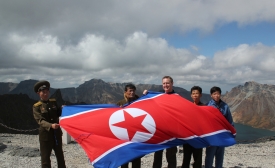soft power
The Korean dumplings in your grocer's freezer, the new Thai restaurant on the corner and that Burmese curry you ate for lunch are doing more than satisfying your craving for an exotic and flavorful meal. These foods are also helping to foster international relations.
The Korean dumplings in your grocer's freezer, the new Thai restaurant on the corner and that Burmese curry you ate for lunch are doing more than satisfying your craving for an exotic and flavorful meal. These foods are also helping to foster international relations. A new diplomacy program -- called gastrodiplomacy -- is giving food a seat at the negotiating table.
Philip Seib is the director of the Center for Public Diplomacy and spoke to PM from Los Angeles. PHILIP SEIB: He realises that the more Westerners, particularly Americans, who go to study in China, the greater the trade relationship between the two countries will be, but also the more stable the relationship will be. And stability is a good thing in diplomacy and in international economics.

Sherine B. Walton, Editor-in-Chief
Naomi Leight, Managing Editor
Kia Hays, Associate Editor
From a foreigner`s view, Korea is a very impressive country. In just 50 years or so, Korea overcame the disasters of war and division of two Koreas through utmost effort and sacrifice, and became the world`s seventh largest exporter. The country exhibited an unprecedented pace of economic growth as exemplified by the "Miracle of Han River," the story of which is much touted among foreigners.
So what can $300 million buy you in China? Perhaps, the Chinese version of the Rhodes Scholarship. That's what the Chinese and American private equity mogul Stephen Schwarzman are hoping. The Blackstone Group founder is doling out $100 million of his own money and raising another $200 million to set up an international scholarship program at elite Tsinghua University in Beijing. Alumni include business leaders as well asa China's president, Xi Jinping.
In the first three months of this year, ticket sales for American-made films in the world's second-largest cinema market took an unexpected nosedive. Hollywood's revenues fell by about two thirds in China, compared with the same period a year earlier, to about $A195 million, as big-budget titles such as The Hobbit: An Unexpected Journey failed to impress.
The Journal of Chilean Diplomatic Academy, ‘Diplomacia’ has recently published various essays on famous writers who were also successful diplomats. The content is not only valuable for its biographic details but it could additionally open a topic that needs to be developed further by writers and diplomats.







